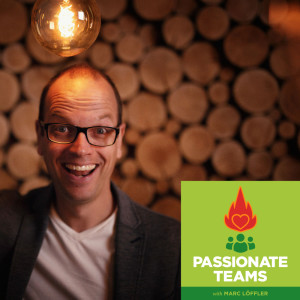
264.6K
Downloads
347
Episodes
Agile Unfiltered – mit Marc Löffler ist der Podcast für alle, die echte Transformation erleben und verstehen wollen.
Ohne Filter. Ohne Buzzwords. Ohne Theater.
Marc Löffler gehört zu den bekanntesten Agile Coaches im deutschsprachigen Raum und bringt über 20 Jahre Erfahrung aus Transformationsprojekten, Leadership-Workshops und Teamcoaching mit.
In jeder Folge bekommst du:
-
ungeschönte Einblicke in reale Transformationen
-
Werkzeuge, die wirklich wirken
-
systemische Perspektiven auf Teams & Organisation
-
Klartext über Leadership, Change und Zusammenarbeit
-
praktische Tipps für Scrum Master, Agile Coaches & Führungskräfte
Die Folgen sind ehrlich, direkt und sofort nutzbar.
Neue Folge jeden Dienstag.
Agile Unfiltered – mit Marc Löffler ist der Podcast für alle, die echte Transformation erleben und verstehen wollen.
Ohne Filter. Ohne Buzzwords. Ohne Theater.
Marc Löffler gehört zu den bekanntesten Agile Coaches im deutschsprachigen Raum und bringt über 20 Jahre Erfahrung aus Transformationsprojekten, Leadership-Workshops und Teamcoaching mit.
In jeder Folge bekommst du:
-
ungeschönte Einblicke in reale Transformationen
-
Werkzeuge, die wirklich wirken
-
systemische Perspektiven auf Teams & Organisation
-
Klartext über Leadership, Change und Zusammenarbeit
-
praktische Tipps für Scrum Master, Agile Coaches & Führungskräfte
Die Folgen sind ehrlich, direkt und sofort nutzbar.
Neue Folge jeden Dienstag.
Episodes

Tuesday Jan 16, 2018
An interview with Virginia Anderson
Tuesday Jan 16, 2018
Tuesday Jan 16, 2018
Key Take-aways
Passionate teams are able to harness their power together
My definition [of a passionate team] is a team that has a purpose and are able to harness their power together. They're able to take that power and go above and beyond what's expected of them. So in America you say a person gives 110 percent and that 110 percent can be to surpass expectations or it can be to get through really difficult times and achieve what they need to achieve.
Passionate teams have a goal
I would say we had a goal. We knew we had to execute for the clients. And in the banking sector, which is quite interesting, is that if you make mistakes you know that there will be financial losses. So there's another driver there. There's also a competitive mindset in pride that I'm not going to make a mistake because I don't want to make a financial loss.
Passionate teams share losses
In the end, what we did was we analyzed what went wrong, what happened. We looked at it from the people in Brazil and the people in the UK and the people where I was working in Luxembourg, and we realized, well wait a second, you know, and I had people say to me, "But it wasn't your fault. You really didn't make a mistake," but I still said, "No, wait. I created the overflow of information," so I created this chain, and in the end they shared the loss because it's a huge international organization. They shared the loss between the different offices, which can be done, and they took that actual mistake and they put the learnings behind it. And in the end they use it today as a training course for people.
Passionate teams csn trust each other
So this learning culture is ... they're not forgetting the past and that really, for me, that creates a really strong team culture because people will realize, "Wait. I can trust the person if I have a question, I can pick up the phone, I can ask, I can get the right information. I don't just have to put my head down, close my eyes, forget about it, and just do my job. There are other people out there who can help me," and it was quite interesting.
Passionate teams support each other
They also need to know that they have support from other people. For example, if I'm playing basketball and I get injured, I need to know that if I'm replaced that other person can also come in and perform at the same type of level as I'm performing. And I find that's incredibly important is to empower people and trust them and allow them to, I would say, to have a voice and to be able to play to their best ability.
Passioante teams balance creativity and regulated processes
I always say your first team is only as good as your second team pushes you. And many times the first team, if they don't think they have to improve, they don't think they have to be creative, or they're forced to work in a certain way, they're never going to reach their full potential. When you have a second team that's competing, but also pushing that team, it can be in a very positive way, it can be in a competitive way, it allows for teams to really perform and not be complacent. And I think in the corporate world also, I've seen in the corporate teams, we need these creative people. We need these people who will speak out, but we also need the other people who will stick to their processes and procedures too.
Passionate leaders can be like a conductor
I mean, also as a professional basketball player, I mean, I could've been that one professional person who takes over and says, "I'm going to do everything," for me, no. It's like, if I'm going to be the leader of the team I'm more of an orchestrator, like a conductor. And I know there's times where if everyone was going to stop me, that there's a lot of other people who are free and available. I can be a decoy and I can easily pass the ball to somebody who can make a basket and win the game and just you see their eyes light up and feel proud and happy, for me is absolutely amazing.

5 years ago
Thank you, Marc